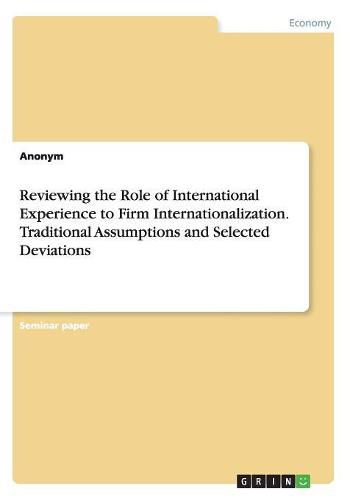Readings Newsletter
Become a Readings Member to make your shopping experience even easier.
Sign in or sign up for free!
You’re not far away from qualifying for FREE standard shipping within Australia
You’ve qualified for FREE standard shipping within Australia
The cart is loading…






Seminar paper from the year 2015 in the subject Business economics - Marketing, Corporate Communication, CRM, Market Research, Social Media, grade: 1,0, University of Dalarna, language: English, abstract: Expanding onto foreign markets and being successive abroad is often considered as the peak of business success of a firm. Unsurprisingly, the process of firm internationalization received a lot of attention from scholars. A major influence to the pace and pattern of firm internationalization is international experience and resulting knowledge. In fact, knowledge is considered to be a main driver for competitive advantages. However, in spite of its identified importance, literature has yet to present a unifying theory which explains its exact role and impact to the process of internationalization. This noble aim may be aggravated by the fact that different types of firms appear to be effected dissimilarly by accrued international experience. Moreover, international experience is gained, processed and exploited in various ways resulting in diverse firm specific advantages. These differences in experiential learning further contribute to the complexity on grasping the issue. Finally, the process of internationalization itself includes many different aspects and hence does the effects of international experience to such. Just to name a few, scholars reviewed the role of international experience to the choice of entry mode, establishment mod, market selection or pace of internationalization. The resulting assumptions regarding international experience are broad and, unfortunately, often contradicting. This paper attempts to review selected deviating effects of international experience from the traditional frameworks and analyze their specifications. By doing so, one may be able to bridge gaps to traditional models or further highlight insufficiencies of such. When referring to the traditional framework of firm internationalization, this paper refers to the seminal work
$9.00 standard shipping within Australia
FREE standard shipping within Australia for orders over $100.00
Express & International shipping calculated at checkout
Seminar paper from the year 2015 in the subject Business economics - Marketing, Corporate Communication, CRM, Market Research, Social Media, grade: 1,0, University of Dalarna, language: English, abstract: Expanding onto foreign markets and being successive abroad is often considered as the peak of business success of a firm. Unsurprisingly, the process of firm internationalization received a lot of attention from scholars. A major influence to the pace and pattern of firm internationalization is international experience and resulting knowledge. In fact, knowledge is considered to be a main driver for competitive advantages. However, in spite of its identified importance, literature has yet to present a unifying theory which explains its exact role and impact to the process of internationalization. This noble aim may be aggravated by the fact that different types of firms appear to be effected dissimilarly by accrued international experience. Moreover, international experience is gained, processed and exploited in various ways resulting in diverse firm specific advantages. These differences in experiential learning further contribute to the complexity on grasping the issue. Finally, the process of internationalization itself includes many different aspects and hence does the effects of international experience to such. Just to name a few, scholars reviewed the role of international experience to the choice of entry mode, establishment mod, market selection or pace of internationalization. The resulting assumptions regarding international experience are broad and, unfortunately, often contradicting. This paper attempts to review selected deviating effects of international experience from the traditional frameworks and analyze their specifications. By doing so, one may be able to bridge gaps to traditional models or further highlight insufficiencies of such. When referring to the traditional framework of firm internationalization, this paper refers to the seminal work